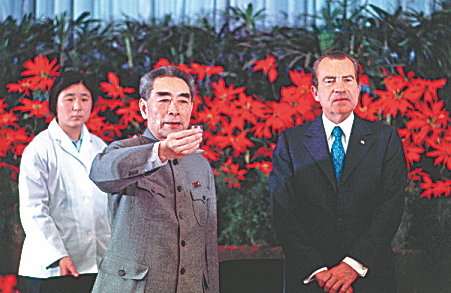

"Everyone in the president's party was invited, including aircrews and baggage handlers, flowing in an excited crowd up the staircase," said Platt, who ran into some of his journalist friends with whom he had become acquainted during his "China-watching days" as political officer at the US consulate general in Hong Kong in the 60s. "A joyful, inquisitive panda" was how he describes Stanley Karnow of The Washington Post.
The young diplomat himself was also "basking in the incongruity of the situation", one contributed to by a Chinese army band playing "sublime and authentic" American music.
The time difference between China and the US meant that while Nixon and Zhou were toasting, many Americans were sitting in front of their TV sets watching.
"The coverage led to almost instant romance and euphoria,"Lord said."This reflected an inbuilt respect and affection for the Chinese people, which certainly was reciprocated."
"This move, clearly popular around the world, also lifted the morale. The American people, fatigued and demoralized by years of domestic turmoil and the costly Vietnam War, saw that we could still act dramatically on the world stage."
He was echoing Nixon, who lamented during his inauguration speech in January 1969 that "We are caught in war, wanting peace. We are torn by division, wanting unity" and who remarked before the trip that "all Americans have a stake in this visit".
"Maybe there wasn't a sophisticated analysis of these issues like it would be among the elite, but I think the American people instinctively understood that this opening could yield diplomatic benefits for the United States," Lord said, conceding at the same time that it was "a coolheaded, hardheaded and calculated sense of geopolitics which drove our desire to open up to China".
To stabilize Asia and have more flexibility on the world stage, to gain more leverage and improve relations with the Soviet Union and to end the Vietnam War are the three major reasons listed by Lord, a major drafter of the 1973 Paris Peace Accords which eventually ended the 20-year-conflict.
Then there's the fourth, "much less important for Nixon and Kissinger but a long-range consideration", and that was "the potential of economic relations with China",Lord said.